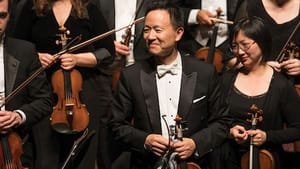Stay in the Loop
BSR publishes on a weekly schedule, with an email newsletter every Wednesday and Thursday morning. There’s no paywall, and subscribing is always free.
Sturm, drang, and welcome quiet
Philadelphia Orchestra presents Bach and Bruckner

Bach and Bruckner — Philadelphia Orchestra’s current program, playing through November 11 — presents a study in contrasts. Bach scored his Violin Concerto No. 2 in E Major, BWV 1042 (1720) for strings alone, creating an intimate soundscape akin to chamber music.
Anton Bruckner’s Symphony No. 8 in C Minor (1887) requires three harps, twelve horns, and just about every string player in an orchestra’s stable. On opening night, conductor Yannick Nézet-Séguin provided brio and restraint as needed.
Shining with grace and humor
Programming the Bach concerto could easily be interpreted as a gift for David Kim, the orchestra’s stalwart concertmaster since 1999. Kim undertook soloist duties for the three-movement piece, performing with style, grace, and a fair amount of humor. He never pushed the limits of good taste in the opening Allegro, blending seamlessly with the ensemble when necessary. His intelligence shone through when playing in counterpoint, allowing the solo line to subtly but distinctively emerge. The eight-minute movement created the overall effect of a Baroque country dance.
Kim took a contemplative approach to the solo-driven Adagio. His violin sailed above the playing of his fellow musicians, notable for impeccable intonation that kept notes from slurring together. I’ve long thought of this movement as a momentary wave of sadness overtaking an otherwise joyous occasion. The orchestra engendered that sentiment without dipping into excess, which balanced nicely with their spirited push into the concluding Allegro assai.
Nézet-Séguin, who can be something of a showboater, appeared to take stylistic cues from Kim. Conducting freehand, he let the simplest gestures direct his players toward bits of hidden insight, particularly throughout the second movement. This resulted in an intimately rendered reading of a familiar repertory staple that repeatedly drew in the listener. I felt as close to the music as I imagine I would have in a candlelit 18th-century salon.
Too much schleppend
Intimacy certainly doesn’t define Bruckner’s music — nor does familiarity. But his grandiose compositions inspire a near-fanatical level of loyalty. (The gentleman sitting behind me remarked that he’d traveled from Boston just to hear the concert.) Nézet-Séguin could certainly be counted among Bruckner’s devotees; press materials claim the Austrian composer is “the only composer he feels as if he had conducted in a previous life.” In that spirit, he led the daunting 85-minute Symphony No. 8 from memory.
Nézet-Séguin conducted the definitive Haas edition of the score, which dates from 1939, and his ever-present enthusiasm for the music never wavered. However, he did not follow the advice given for the long symphony’s third movement, which has the directional title Feierlich langsam, doch nicht schleppend (solemnly slow, but not dragging). Although gorgeous sound filled Verizon Hall, the noticeably unhurried tempo occasionally produced a numbing effect that made the musical intentions hard to follow. It caused the brass-heavy final movement to emerge jarringly, like a blaring alarm clock admonishing you for oversleeping.
Still, the orchestra’s reading offered many singular pleasures. Kim rejoined the strings in the concertmaster’s chair, and the glut of violins, violas, cellos, and basses alternated between shimmering sonority and foreboding dread. Principal tuba Carol Jantsch anchored the demanding brass requirements. Percussionists Anthony Orlando and Angela Zator Nelson thundered from the rear of the stage. And although Nézet-Séguin’s reading won’t erase memories of the legendary recordings made by Karajan and Boulez, he brought admirable energy to a score he clearly loves.
Bach and Bruckner were both deeply religious — the former within the German Lutheran tradition, the latter an Austrian Catholic. In the most inspired moments of this double bill, I had no doubt these compositions were meant to be seen as communions with God. It resonated most clearly whenever Kim took center stage.
What, When, Where
Bach and Bruckner. Yannick Nézet-Séguin, conductor; David Kim, violin. Bach, Violin Concerto No. 2; Bruckner, Symphony No. 8. Philadelphia Orchestra. Through Saturday, November 11, 2017, at the Kimmel Center’s Verizon Hall, 300 S. Broad Street, Philadelphia. (215) 893-1999 or philorch.org.
Sign up for our newsletter
All of the week's new articles, all in one place. Sign up for the free weekly BSR newsletters, and don't miss a conversation.
 Cameron Kelsall
Cameron Kelsall